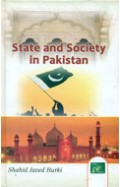Pakistan: Political & Constitutional Engineering
By: Hasan Askari Rizvi
-
Rs 3,000.00
- Rs 4,000.00
- 25%
You save Rs 1,000.00.
Due to constant currency fluctuation, prices are subject to change with or without notice.
A chronicle of Pakistan's political history that offers concise accounts of the major political events and constitutional issues, the making and the breaking of interim and regular constitutions going back to the establishment of Pakistan in August 1947. The book focuses on Pakistan's challenges of state building and nation building, and the search for a viable participatory political order. It examines political and constitutional engineering by civilian and military-bureaucratic governments to serve their partisan interests, and Pakistan's conflictual politics devoid of the democratic culture and civility. The book also offers insights into the changing patterns of civil-military relations, ascendancy of the military to political power, civilianization of military rule through power-sharing, and the shift from military "rule" to "role". It also examines the internal and external dimensions of the East Pakistan/Bangladesh crisis, national and provincial elections, protest movements including the lawyers movement and the Caretaker governance system in Pakistan.
A chronicle of Pakistan's political history that offers concise accounts of the major political events and constitutional issues, the making and the breaking of interim and regular constitutions going back to the establishment of Pakistan in August 1947. The book focuses on Pakistan's challenges of state building and nation building, and the search for a viable participatory political order. It examines political and constitutional engineering by civilian and military-bureaucratic governments to serve their partisan interests, and Pakistan's conflictual politics devoid of the democratic culture and civility. The book also offers insights into the changing patterns of civil-military relations, ascendancy of the military to political power, civilianization of military rule through power-sharing, and the shift from military "rule" to "role". It also examines the internal and external dimensions of the East Pakistan/Bangladesh crisis, national and provincial elections, protest movements including the lawyers movement and the Caretaker governance system in Pakistan.
Pakistan: Political & Constitutional Engineering
By: Hasan Askari Rizvi
Rs 3,000.00 Rs 4,000.00 Ex Tax :Rs 3,000.00
Zubin Mehta: A Musical Journey (An Authorized Biography)
By: VOID - Bakhtiar K. Dadabhoy
Rs 472.50 Rs 1,050.00 Ex Tax :Rs 472.50
Myths Illusions and Peace: Finding a New Direction for America in the Middle East
By: Dennis Ross
Rs 876.00 Rs 1,095.00 Ex Tax :Rs 876.00
The Origins of Political Order From Prehuman Times to the French RevolutioN
By: Francis Fukuyama
Rs 3,116.00 Rs 3,895.00 Ex Tax :Rs 3,116.00
Manning Up: How the Rise of Women Has Turned Men into Boys
By: Kay Hymowitz
Rs 646.75 Rs 995.00 Ex Tax :Rs 646.75
The Obama Syndrome: Surrender At Home War Abroad
By: Tariq Ali
Rs 1,036.00 Rs 1,295.00 Ex Tax :Rs 1,036.00
The Quest For Meaning: Developing A Philosophy Of Pluralism
By: Tariq Ramadan
Rs 1,116.00 Rs 1,395.00 Ex Tax :Rs 1,116.00
No similar books from this author available at the moment.
No recently viewed books available at the moment.
Zubin Mehta: A Musical Journey (An Authorized Biography)
By: VOID - Bakhtiar K. Dadabhoy
Rs 472.50 Rs 1,050.00 Ex Tax :Rs 472.50
Pakistan: Political & Constitutional Engineering
By: Hasan Askari Rizvi
Rs 3,000.00 Rs 4,000.00 Ex Tax :Rs 3,000.00














-120x187.jpg?q6)







-120x187.jpg?q6)





